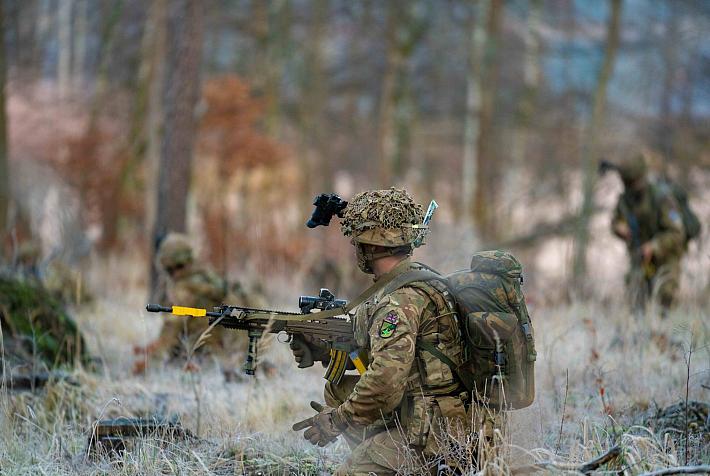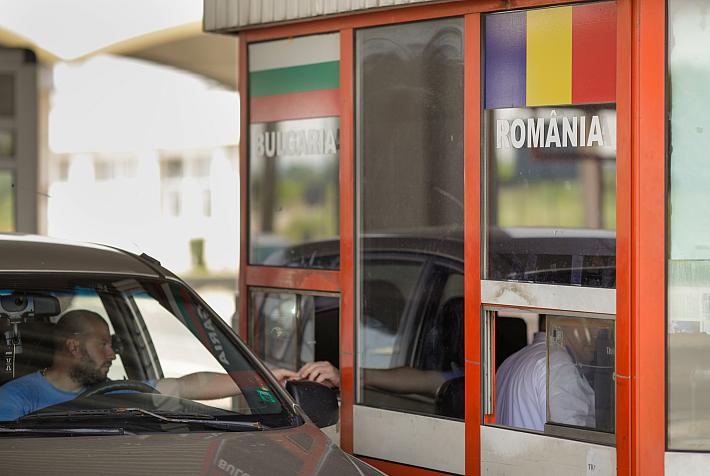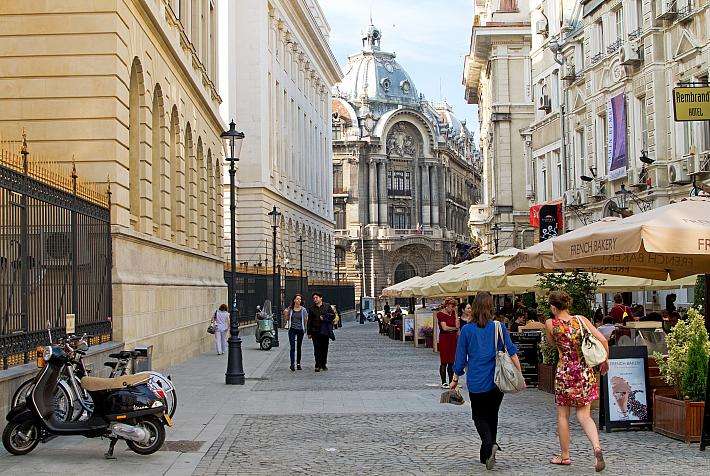The life of Ben Ellerby, the young British teacher in Calarasi, Southern Romania
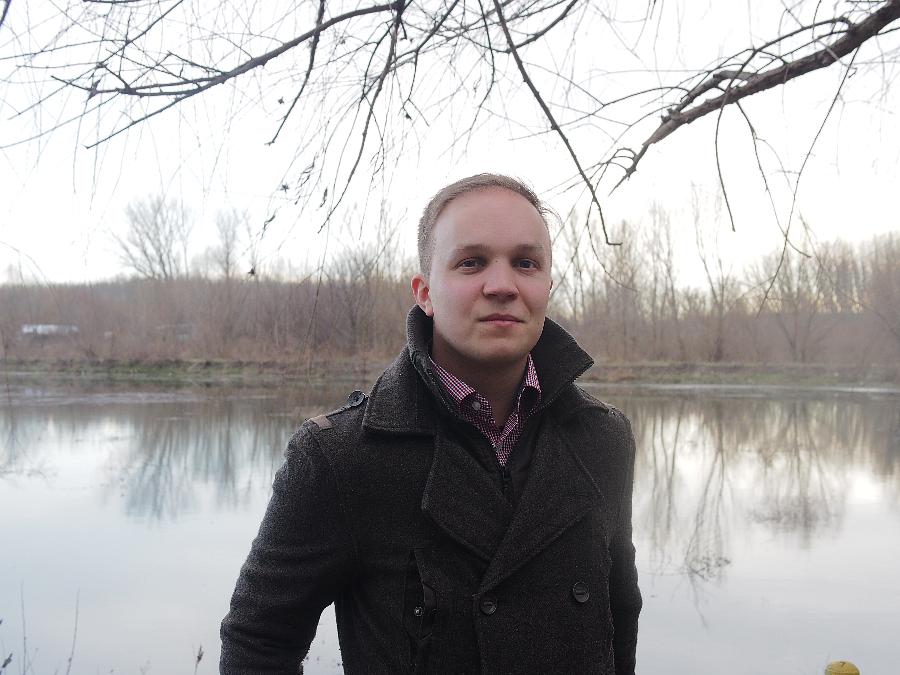
Chomsky, Jack the Ripper and Kurt Cobain cross roads in a small Romanian town.
In a private school in the southern Romanian town of Calarasi, the 26-year old British teacher Ben Ellerby explains the essence of modern media: it’s not the product- the newspaper- that’s actually sold to advertisers, but the audience. It is a sunny day in the beginning of February, and Ben’s audience, a dozen of ninth- and tenth-graders, are already wearing t-shirts. Today’s topic for the sociology class in English is “Does the media serve us propaganda for the powerful?”
Ben starts the lesson by introducing Noam Chomsky, the man who “created the field of modern linguistics.”
“Wow,” exclaims a girl who plays the bass in one of the school’s bands. She has long, red hair, and a t-shirt with a rock band. Ben then tells his students that he himself might be biased in relation to this topic, because he has a particular interest in it. He wrote his master thesis starting from Chomsky’s theory on media.
“Yeah, but perfect objectivity is impossible,” says a 15-year old boy called Alex. He’s started playing drums some months ago, and his goal is to become better than Ben whom he really admires.
The British teacher doesn’t look much older than his students, and he manages to catch their curiosity. He has prepared a series of videos and slide shows to illustrate this sociological theory on media. Kids are particularly bemused by one of Donald Trump’s remarks. The US presidential candidate suggested that a journalist was challenging him because she was on her period. “Did he really say that?” asks one of the girls in the classroom.
Ben always takes time to prepare his lessons. He is the only foreign teacher in the school. He is also the only English person living in the small town of Calarasi in Southern Romania.
The bubble
The bus passes by the ruins of a factory. A board reads: “Siderca Calarasi - company under bankruptcy.” Not far away, another mammoth shows up. It’s the Italian steel producer Tenaris, which is operational and employs about 300 people. Then the bus slides by a car service, a funeral shop, a car wash, a hair saloon, a car wash again. We have entered Calarasi, a town with 65,000 people, situated on the bank of Danube's Borcea branch and 12 km from the Bulgarian border.
Ben Ellerby is waiting in front of Penny Market, the end of line for those travelling by bus from Bucharest to Calarasi. I’ve come to meet him and take part in his classes, band rehearsals and any other activities he plans for the day. How is the life of a young teacher in this not very glamorous Romanian town?
His first class starts in about 30 minutes so we hurry up to the school. He has vivid blue eyes and talks enthusiastically. Previous to Calarasi, he taught in Kathmandu for one year, and before that he was a political science student at Lancaster University: living in a bubble, with no idea of what he’ll do next.
The private school where Ben now teaches also seems a sort of a bubble. The teachers’ room is very small and all the teachers gathered there are young. They all make jokes and laugh. Andrei, the music teacher and one of Ben’s best friends, is also there. Ben shows me his “messy place”, where he keeps the materials he has prepared for classes.
He takes his blue rucksack, stuffed with things and almost as big as his torso, and heads to the first class. Two groups of kids have to write a movie script, and then actually make the movie. Ben has in his rucksack a green screen, an instrument that helps remove the background from the subject of a video or a photo. “Calarasi is not the most futuristic town, but it’s also not Victorian England,” Ben says. So he has brought the green screen along, although the kids are still far from shooting the movie. For now it’s the screenwriting stage.
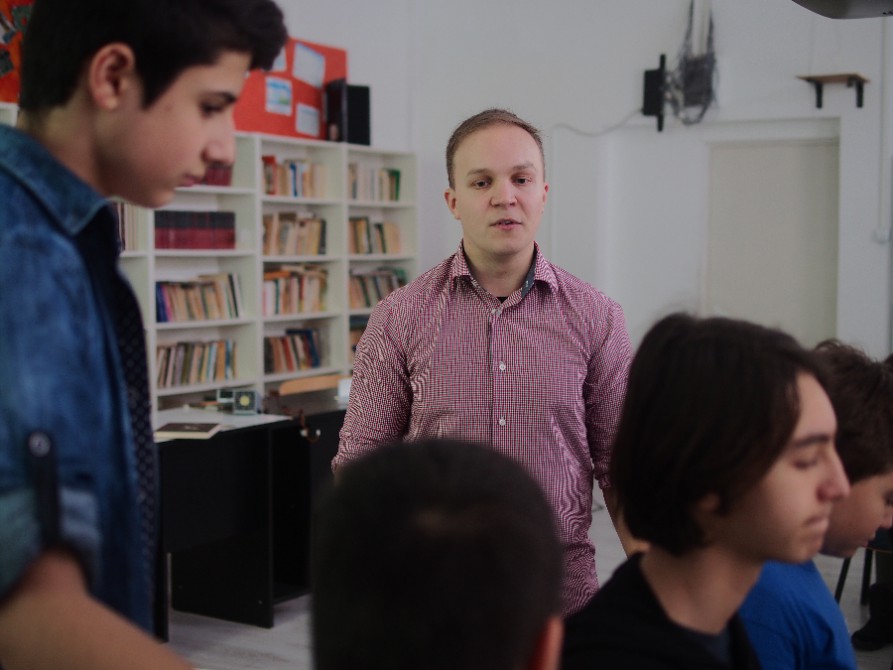 Ben Ellerby among his students who are working on two screenplays
Ben Ellerby among his students who are working on two screenplaysIn a classroom with many computers, four boys are creating the characters of their movie on the Black Death. Some computers away, a group of girls are working on the story of Jack the Ripper. The script starts from the end and goes backwards, similar to the noir movies of the ‘50s. All girls are wearing sneakers and have long hair, but only one is typing. “This is the ending of a never ending story that will survive long after the character’s death.”
In the boys’ group, Alex, a tall, skinny ninth-grader, is the one typing. “He’s patient zero in England, but not for the Black Death in general,” Alex describes his character to Ben. He often stops to discuss with the teacher and the other boys on what line should come next. He is very theatrical and has long hair covering his ears. He throws his hands in the air when he speaks, as if he simply had too many ideas and words were not enough.
The boys seem stuck with the story.
“Ok, summarize the plot of the movie in one sentence,” says Ben.
“No spoiler alert,” replies Alex.
“You can spoil it for me,” Ben says.
The Garage
The first months in Calarasi were rather boring. Ben arrived in August 2013 and moved into an apartment above a pizzeria. He bought an electronic drum kit for his place, because at that time he hadn’t yet discovered the Garage.
The school was not far from home: just 30 seconds by bike literally. He could wake up an hour before his first class, which was great because he is not a morning person. The hardest part was meeting people. Up to a point, his life in Calarasi was hanging out with lovely persons who didn’t speak English. But then the art teacher introduced him to Andrei, who later became the music teacher, a guy of his age who played guitar and had a place called The Garage where the local bands in Calarasi were rehearsing. That was the hook for Ben. He had a place to rehearse every day, and even more, he could meet other musicians.
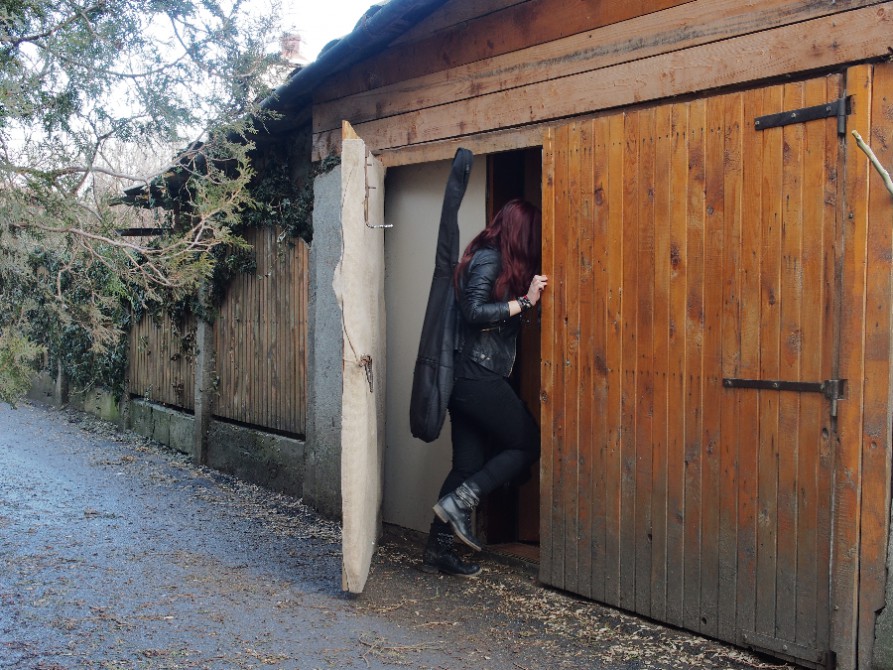 A high school student going to the Garage for rehearsals after classes
A high school student going to the Garage for rehearsals after classesThe Garage is located on a very narrow street that has pine trees, right next to the house where Andrei grew up. It has a big wooden door which creates a good buffer. From inside the Garage, you can’t hear Andrei’s big dog barking, and from outside you do hear some music, but at a low level. The street remains stays in silence and shadow.
Having local bands rehearse at the Garage was great, but Andrei and Ben thought about transforming the place. After all, the school where the two men taught was a five-minute walk away from the Garage. Kids of all ages could learn playing instruments there and more bands could be formed. It would be fun, and great for Calarasi’s future in music. Not a lot of stuff was happening in the town, so why not plant some seeds, the two men thought.
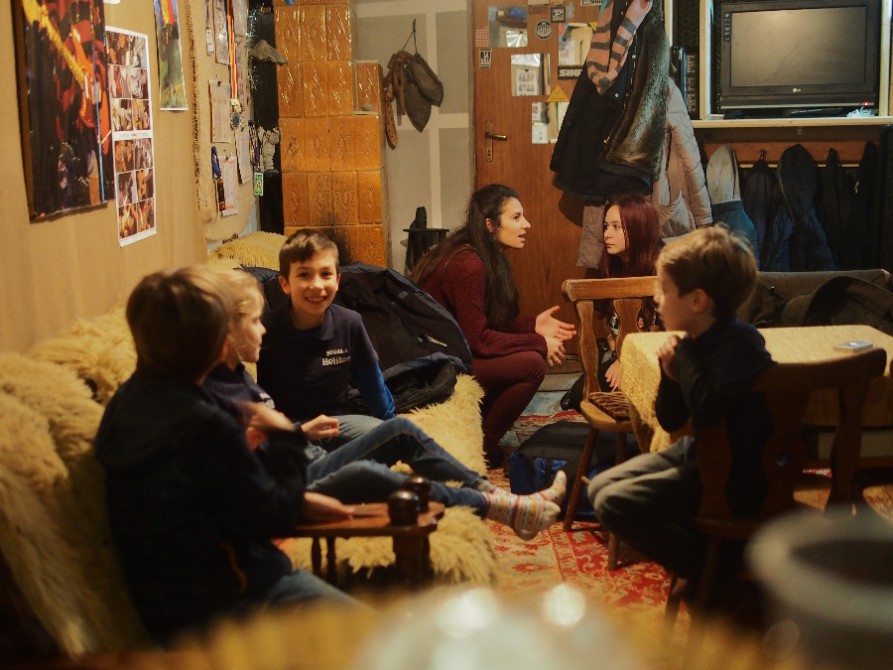 Students hanging out at the Garage
Students hanging out at the GarageAfter Ben finishes his classes, we go visit the Garage. Behind the wooden door, several 7-year old kids stay on a big couch, laughing and and waiting for their turn to rehearse. The place looks like a cosy mountain cabin. It’s warm, it has wool rugs, a stove, a big poster with Kurt Cobain, many books, vinyls. Next to the the younger kids, some teenage girls just sit around a table and talk. A ninth grade boy heads to the piano and start playing a The White Stripes song. The little kids gather around him and tickle him. Everybody takes their shoes off as they enter the Garage. They move across the room in colorful socks.
Then rehearsals start.
First the little ones: they look even smaller behind the big instruments, but they are serious and focused and try not to lose the rhythm. Andrei stays on the side and tells them sometimes what they need to do. Ben has crashed on a couch and watches them playing.
The next group are girls and boys that are 14-15 year old. Ben himself started playing the drums at that age. At 14, his father Chris lent him the money to buy a drum kit. His dad was working in the local council, and was very good at his job but never really liked it. It was bringing decent money, but was not very fulfilling. Chris now looks at Ben’s career and wishes he had done something different, that he worked in different countries. It was his dad who actually put him in contact with a man who told Ben about the teaching job in Kathmandu. Ben’s mom Helen is a Sunday school teacher. Ben’s sister Hannah works at the University of Kent in the international department. She is also studying part time for a master’s degree in computer science and plays the violin in an alternative folk band. They had just launched their first album on a boat last month.
Ben’s dream would be to actual make a living from playing drums. He enjoys teaching but it can be stressful. It’s a lot of work and sometimes you’re not that appreciated. Ben says that he was a lazy student who found creative ways to postpone doing his homeworks. But as a teacher he is very much the opposite. “If it's worth doing, it's worth doing properly,” Ben says.
For the business class he teaches, he has created a currency with his face instead of the queen’s just to make it fun explaining how the stock exchange works. He also helped a class create a currency for their high school bourse. The kids have chosen the potato as the main symbol on their money because they are obsessed with potatoes. Each classroom is an economy. In the first year, they used used the “Ben” currency, but now they also have the “Potato” currency.
When the school director Oana Moraru asked Ben to make a movie about the school for Christmas, he wanted to create something special. He came to school before sunrise several mornings, when the place was totally empty, so he could make a timelapse of the transition from night to day- the sun rising over the school and then things getting a bit crazy as people start arriving. During the day he set the camera in a more obvious location hoping the kids would see it and start messing around in front of the camera. It lasted a couple of weeks of getting all the footage, and then in the night before the deadline he worked until 5.45 am to do the editing. He was so pumped full of energy drinks, that sleep wasn't really on the cards that night.
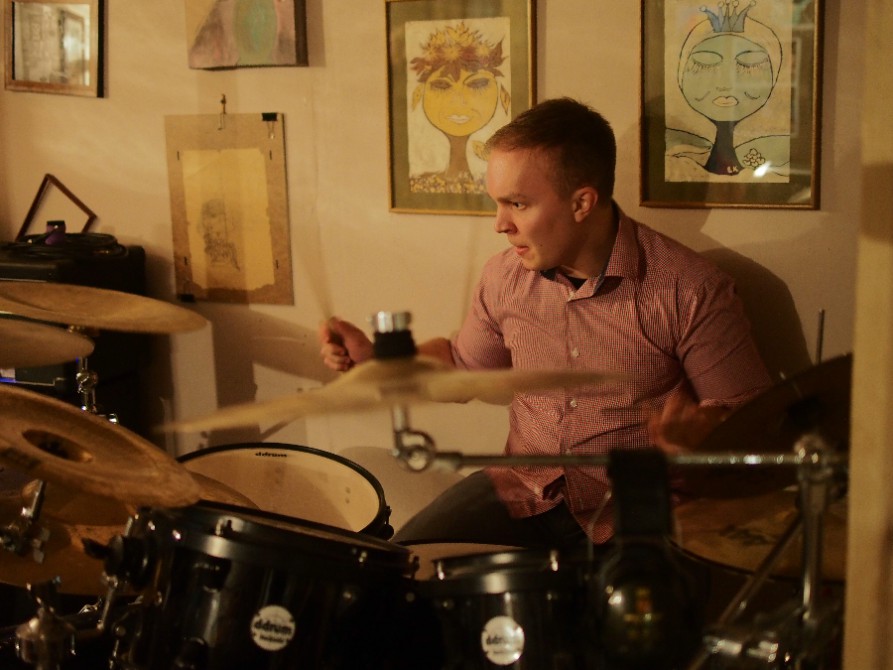 Ben Ellerby rehearsing after classes
Ben Ellerby rehearsing after classesBesides all the classes that Ben minutiously prepares, there’s the eternal dilemma about teaching. How to have a good relationship with the students without losing their respect? Alex, the boy who has started playing drums, is always asking Ben “Am I your friend or you are just my teacher?”, and Ben replies, “I am your teacher first but I’ll be your friend as well.” But it’s a tricky part. “With a guy like Alex is fine, but other kids will start testing the limits and go a little bit further,” says Ben.
But music is the real freedom.
In the Garage, after all the kids finish playing, Ben takes his seat behind the drumset and Andrei grabs his guitar. They rehearse one song only, and their audience is made of up kids and teenagers. But they are so rapidly absorbed into the music that it feels like the entire weight of a day simply dissolves through this focused release of energy.
“You can’t really control your face when you play drums,” Ben says afterwards laughing.
The only English person in town
Danube is some kilometers away from the actual city, so we give up the idea of walking to the river. Ben says that he and Andrei often cycle there. It’s the beginning of February, but there are some patches of snow left. Storks will be back soon. Ben really likes seeing stork families on street lights. That’s not a view to be seen in England.
As we are walking to the bus station, it’s getting darker. We pass by the zoo. “Our depressing zoo,” Ben says. Then we go through a park which is torn apart by some bulldozers making place for some new developments. A little girl passes by and says in a happy voice “Hello, Ben!” He greets her, then tells me “I don’t think she’s one of my students”. “Yeah, but you’re the only English person in town,” I reply.
 The entrance of the zoo in Calarasi
The entrance of the zoo in Calarasi“My five-year plan is that I don’t have a five year plan,” Ben says. He doesn’t know whether he’ll be in Romania or another country, but he’s pretty sure he won’t be back in England any time soon. He likes the school so much, only if it somehow were in a different town. “I’d be satisfied with a slightly more varied social life,” Ben says.
The last bus to Bucharest leaves at 5.30 pm. I thank him for the meeting. He replies. “Thanks for taking interest. It’s not like I have done anything special.”
“I’m just a teacher who plays the drums.”
By Diana Mesesan, features writer, diana@romania-insider.com
Photos by Diana Mesesan








